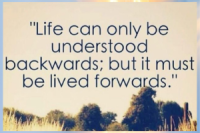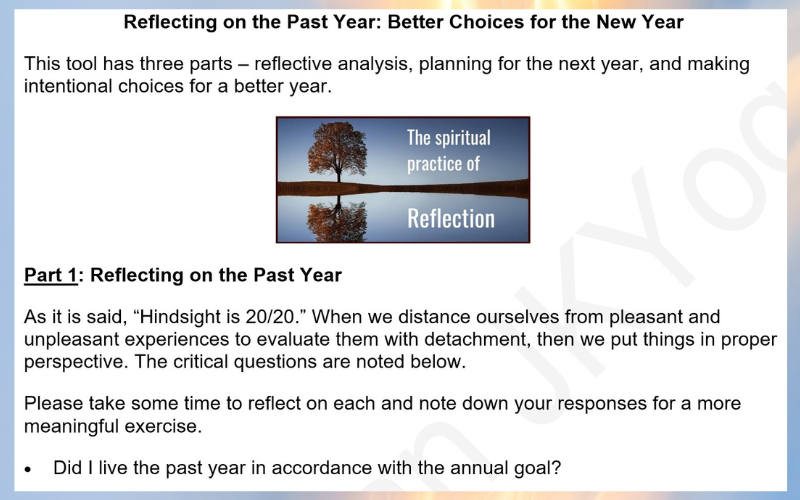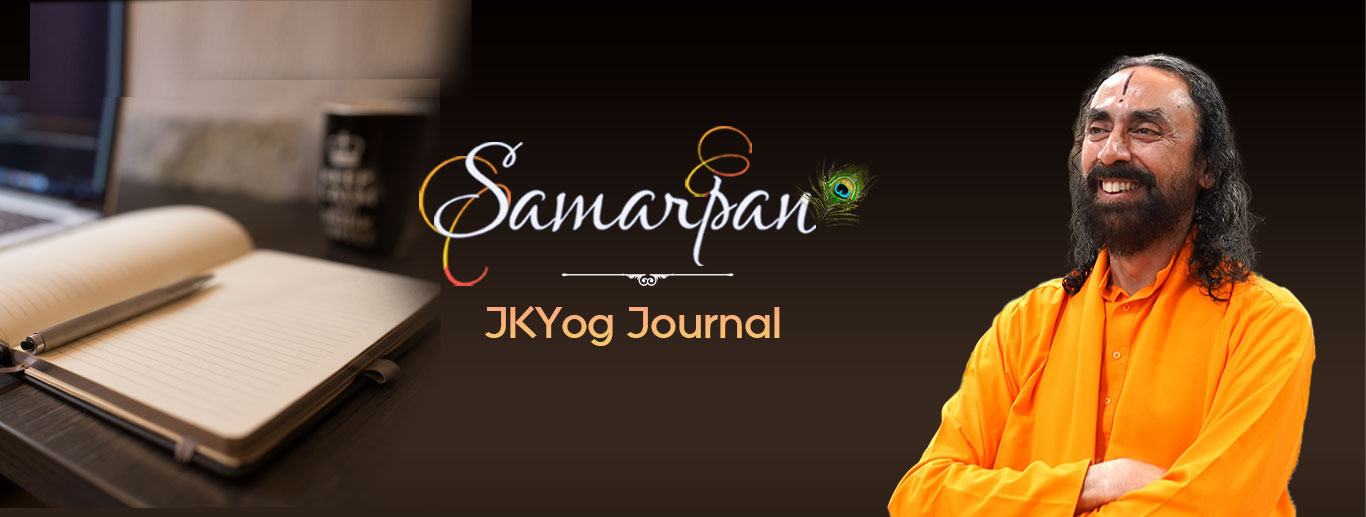
From the Editor’s Desk
Reflecting on the past year is not merely a nostalgic exercise but an insightful practice that can pave the way for a more purposeful and fulfilling year ahead. Such a practice holds the power to transform our lives based on the wisdom gained from accomplishments and blunders.
Inspired by the desire for inner transformation, this month we focus on practical aspects of how to take stock of past experiences for a better future. This knowledge is drawn from the teachings of Swami Mukundananda and the Vedic scriptures.

Vedic Wisdom & Application
Challenge of the Month
Reflecting on the Past Year: Better Choices for the New Year
Reflection Questions
- What is the Importance of Reflecting on the Past Year?
- How can Reflecting on the Past Year Shape the Upcoming Year?
- How can We make Intentional Choices for a Better Year?
Many of us consider the New Year to be a time for new beginnings, making resolutions for a better year in the hope of accomplishing valued goals. However, the enthusiasm associated with a fresh start wanes as soon as the goals appear difficult to accomplish, usually due to a lack of planning, commitment, or competing interests. Therefore, it is important to use systematic reflection as a tool to inspire self-improvement.
As the current year draws to a close, it is an opportune time to delve into the depths of our experiences to objectively evaluate what went well, what needs to be changed, and how to make better choices for the upcoming year. With enough time to analyze momentous events and profound experiences from the past year, we will be able to determine how they align with our values, goals, and purpose of our lives. This in turn will enable us to create a more viable plan for change.
What is the Importance of Reflecting on the Past Year?

Reflecting on the past year is an invitation to journey within, to explore our experiences and emotions. The process is meant to promote self-awareness, an opportunity to acknowledge the accomplishments, confront the challenges, and embrace the wisdom that unfolds. In the stillness of reflection, we gain insight into the patterns of our lives and recognize the lessons that have shaped our thoughts and actions.
Deep reflective thought is one of the most potent life transformation tools. Its power arises from the constant repetition of a thought. Due to a lack of awareness of its potential, we do not sufficiently utilize it to promote change. If applied correctly, reflection will enable us to cultivate gratitude, humility, and a deeper understanding of how to make better choices and decisions to improve the future. As Swamiji profoundly stated, “First, we make the choices and then the choices we have made, make us.”
The past is not merely a collection of moments but a reservoir of wisdom waiting to be tapped. By reflecting on the thoughts that motivated past actions and influenced our choices, we can position ourselves to become more aware of the mistakes not to be repeated. Such awareness can become a compass to guide us forward and amplify the positive. In the sacred space of reflection, we can connect with our higher selves to make more conscious, purposeful, and discrimination-based decisions. As Shree Krishna explained to Arjun:
प्रवृत्तिंच निवृत्तिं च कार्याकार्ये भयाभये |
बन्धं मोक्षं च या वेत्तिबुद्धि: सा पार्थ सात्त्विकी || 30||
pravrittim cha nivrittim cha karyakarye bhayabhaye
bandham moksham cha ya vetti buddhih sa partha sattviki
The intellect is said to be in the nature of goodness, O Parth, when it understands what is proper action and improper action, what is duty and non-duty, what is to be feared and what is not to be feared, what is binding and what is liberating. (BG 18.30)
The significance of this verse lies in utilizing discrimination to conduct an objective analysis of past experiences, without attachment to our emotions, and engaging in the difficult task of reflective thinking. It is only then that we learn from our experiences.
As it is said, “Hindsight is 20/20.” When we distance ourselves from pleasant and unpleasant experiences to evaluate them with detachment, we put things in proper perspective. The critical questions to ask are:

- Did I live the past year in accordance with the annual goal?
- What were the most memorable experiences of the past year?
- Which choices resulted in positive experiences?
- What challenges made the past year truly difficult to navigate?
- What lessons did I learn from these experiences?
- How did the challenges help me to grow?
- Of all the experiences in the past year, which ones am I most grateful for?
- Which of my beliefs was challenged that I need to discard now?
- Did I make good or productive use of my time?
A deep reflection on these questions will enable us to have a better year ahead.
How can Reflecting on the Past Year Shape the Upcoming Year?
The insights gained through reflection become the building blocks for shaping the upcoming year. By acknowledging the areas that require growth and understanding, we can set realistic goals and intentions. Our goals become more than mere resolutions; they become purified intentions that carry the transformative energy needed to manifest our highest potential. It is then that the results of our efforts also become pure. As Shree Krishna explained to Arjun:
कर्मण: सुकृतस्याहु: सात्त्विकं निर्मलं फलम् |
रजसस्तु फलं दु:खमज्ञानं तमस: फलम् || 16||
karmanah sukritasyahuh sattvikam nirmalam phalam
rajasas tu phalam duhkham ajnanam tamasah phalam
It is said the fruit of actions performed in the mode of goodness bestow pure results. Actions done in the mode of passion result in pain, while those performed in the mode of ignorance result in darkness. (BG 14.16)
As we look back, we gain clarity on what truly matters, allowing us to focus on the valued goal and purpose of life. The accomplishments inspire confidence, while the challenges ignite resilience. Through reflection, we identify patterns and behaviors that no longer serve our highest purpose. Armed with this self-awareness, we embark on the upcoming year with a conscious commitment to change.

A sincere desire for inner transformation is founded on the hope and faith that the ever-benevolent God enables devotees to reform even after they act in offensive ways. Swamiji so beautifully said, “Hopelessness is disrespect to God who has blessed us with an incredible number of graces.” The key is that transformation needs to take place via the medium of devotion. As Shree Krishna explains:
अपि चेत्सुदुराचारो भजते मामनन्यभाक् |
साधुरेव स मन्तव्य: सम्यग्व्यवसितो हि स: || 30||
api chet su-duracharo bhajate mam ananya-bhak
sadhur eva sa mantavyah samyag vyavasito hi sah
Even if the vilest sinners worship Me with exclusive devotion, they are to be considered righteous because they have made the proper resolve. (BG 9.30)
From this perspective, reflection acts as a bridge between the past and the future. After evaluating the past year’s experiences, we can visualize the path ahead from a unique vantage point. The critical questions to address are:
- How will my life’s priorities change as a result of my learned experiences?
- What will I do differently to increase the positive experiences in life?
- What specific mistakes do I need to prevent consciously and intentionally?
- How will I navigate challenges differently when they appear unexpectedly in life?
- What will I do differently to consistently make better choices in my daily life?
- What specific beliefs and attitudes do I need to eject from my mind?
- What “baggage” do I need to leave behind in order to move forward?
- What is the source of my motivation to transform from within?
When we recognize the factors that prevented success in the previous year, the lessons learned will guide our actions for improved decision-making in the future.
How can We make Intentional Choices for a Better Year?
Intentional living is the cornerstone of a spiritually fulfilling life. To make intentional choices, our actions must be aligned with our core values and spiritual principles. This alignment serves as a compass that guides us when we need to make decisions (Bhagavad Gita 16.30).
An action plan to transform from within is founded on knowledge, a mindset of abundance, gratitude, and compassion. Anticipating the future requires a deep understanding of our values, aspirations, and spiritual principles that guide our journey. Then, armed with proper consciousness, enthusiasm, and determination, we forge ahead with a strategic plan for change. As Shree Krishna explained to Arjun:
मुक्तसङ्गोऽनहंवादी धृत्युत्साहसमन्वित: |
सिद्ध्यसिद्ध्योर्निर्विकार: कर्ता सात्त्विक उच्यते || 26||
mukta-sango ‘naham-vadi dhrity-utsaha-samanvitah
siddhy-asiddhyor nirvikarah karta sattvika uchyate
The performer is said to be in the mode of goodness, when he or she is free from egotism and attachment, endowed with enthusiasm and determination, and equipoised in success and failure. (BG 18.26)
We must examine the past not with regret but with gratitude, recognizing that each experience has contributed to the masterpiece of life. Thoughtfully considering our options involves aligning our choices with our spiritual compass, ensuring that they resonate with our core principles and the purpose of life.
Now is the time to engage in strategic thinking to develop an action plan (what and how) to facilitate inner transformation. These are the action items for a better upcoming year.

- Make a list of life’s priorities for 2024 based on my learned experiences.
- Make an action plan to increase the positive experiences in life.
- Make an action plan to prevent serious mistakes made in the past year.
- Make an action plan to manage unexpected challenges in life.
- Make an action plan to consistently make better choices in my daily life.
- Make an action plan to eject false beliefs and negative attitudes from my mind.
- Make an action plan to let go of the “baggage” to move forward with hope and inspiration.
- Make an action plan to remain cognizant of the source of motivation for inner transformation.
- Make an action plan to record daily progress, asses wins and failures, and apply the lessons learned on a regular basis.
All the reflection questions and points for creating an action plan are available below in the section on “Tools for Personal Growth.”

An equally important part of intentional choice-making is to closely monitor the effect of implementing the action plan for inner transformation. Until proficiency is established, daily monitoring will be needed either in the form of a journal or some tracking system that works for you. Swamiji beautifully explained in The Science of Mind Management that conviction in our beliefs is as critical as daily monitoring our efforts, especially on the days we are not successful in proper application. This just means we need more deliberate practice. Daily reflection or contemplation will make a tremendous difference in enabling us toward our goal.

Tools for Your Personal Growth
As it is said, “Hindsight is 20/20.” When we distance ourselves from pleasant and unpleasant experiences to evaluate them with detachment, then we put things in proper perspective. Based on the nuggets shared above, we have created a tool with three parts – reflective analysis, planning for the next year, and making intentional choices with an action plan for a better year.
A downloadable tracking sheet is available for you to use.

Hindsight is 20/20. Use this tool for a reflective analysis, planning for the next year, and making intentional choices for a better year.

Love to Hear from You
- How did you apply the Vedic Wisdom?
- What challenges did you experience in the process?
Please share your comments under “Join the Discussion” below.

Gems of Wisdom from Swamiji
Here are a few YouTube video titles with related links and books where Swamiji has described the kinds of decisions and choices we can make for a successful life.
-
The Power of Small Decisions - How Getting Better 1% a Day Changes Your Life?
-
Mukundananda, S. (2022). The Power of Thoughts, Penguin Random House: Gurugram, India.
-
Mukundananda, S. (2022). Bhagavad Gita – The Song of God, Westland Publications: Chennai, India.
-
Mukundananda, S. (2020). The Science of Mind Management, Westland Publications: Chennai, India.



Hold Your Breath! Check out Upcoming Events
We are very excited to share a dynamite event with you being conducted at the Radha Krishna Temple of Dallas (Allen), the official US Headquarters of JKYog.

JKYog’s Bhagavad Gita Jayanti
The Bhagavad Gita is one of the most revered scriptures that inspires people from all walks of life. We have an opportunity to soak in the divine knowledge as we celebrate Gita Jayanti this month. As part of this celebration, JKYog and the Radha Krishna Temple have organized Bhagavad Gita Jayanti to share the timeless wisdom of Lord Krishna’s divine teachings. This celebration will be held on two consecutive weekends, i.e., December 15 to 17 and 22 to 24, 2023, and feature many beautiful activities including:
- Bhagavad Gita Parayan: JKYog devotees will recite all 700 verses from the 18 chapters of the Holy Scripture
- Swamiji's Keynote Address: Swamiji will deliver a divine Keynote Address to kick off the program
- Pothi Yatra & Bhagavad Gita Poojan: Participants will carry the sacred scripture on their heads and chant the divine name of the Lord as they walk up to the Prayer Hall and engage in a sacred pooja of the Holy Scripture
- Shree Krishna Abhishek: A beautiful Abhishek to honor Shree Krishna will be performed. Everyone is invited to participate
- Bhagavad Gita Special Satsang: Participate in the beautiful melodies of devotional and soulful kirtans to help us remember the divine knowledge bestowed upon us by Lord Krishna
- Cultural Program: A lovely cultural program to showcase the richness of our heritage will also be presented
- Other activities: There will be an amazing collection of many other interesting activities like interactive quizzes, debate, fancy dress, etc.
We invite you to join us for this wonderful occasion either in person or virtually as per your convenience! Stay tuned for more information.

Voices from the Global Community
JKYog’s e-Journal Samarpan inspires the community by introducing members to devotees who have been impacted by the scriptural knowledge taught and disseminated by Swamiji. This month, two devotees, Aditi Vijaykumar and Priyanka Trehan, describe how Swamiji’s teachings have made a difference in how they made better choices for the upcoming year based on an evaluation of the experiences of the current year.


We invite you to share your inspirations and success stories with us at secretary@jkyog.org.

JKYog Transforming Communities
Here, we typically share amazing activities and news about JKYog USA.
Swami Mukundananda’s Official YouTube Channel
When new people introduce themselves to Swamiji in live programs or virtual meetings, approximately 95% of them state that they got to know about Swamiji by watching his videos on YouTube – either his official channel or any of the other channels like Bhakti Lectures, Holy Bhagavad Gita, and many more.
All of Swamiji’s lectures are truly transformational. He makes His videos easily accessible to the global community so everyone can benefit from the divine knowledge of the Vedic scriptures. In this day and age of Kali, most ordinary sadhaks or spiritual aspirants are not equipped with either the memory or the intellectual processing power to grasp the divine knowledge when hearing it for the first time. Thus, it is necessary to listen to the videos repeatedly to comprehend and apply the tatvagyan.
Swamiji’s official YouTube channel has beautifully taxonomized the video lectures by devotional and application-based topics, a collection of Videos, Playlists by specific themes, short clips to remind people of a gem of wisdom, and even videos from Live lectures. There are even inspirational messages on the Community Tab.
The Home Page provides information on Swamiji’s Profile and links to other social media pages, as well as other YouTube channels. We encourage you to take advantage of watching any or all of the videos to elevate your spiritual knowledge and increase devotional sentiments. Here is a sample of some beautiful video categories:
- The Art and Science of Happiness
- Bhakti Shakti Live Lectures
- Guided Meditations
- Shrimad Bhagavatam
- TOP 10 Life Lessons From The Bhagavad Gita

Glimpses of Past Events
Want a glimpse of our events? This month we share beautiful glimpses of the Diwali Mahotsav celebrated in the three Radha Krishna Temples of JKYog in the US, including Dallas (JKYog’s Official Headquarters), North Carolina, and the Bay Area.










